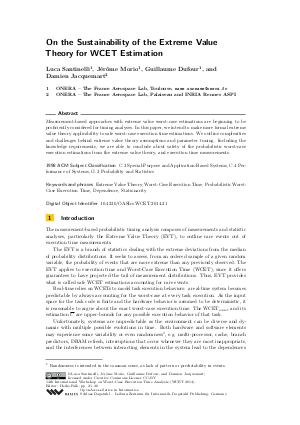On the Sustainability of the Extreme Value Theory for WCET Estimation
Authors Luca Santinelli, Jérôme Morio, Guillaume Dufour, Damien Jacquemart
-
Part of:
Volume:
14th International Workshop on Worst-Case Execution Time Analysis (WCET 2014)
Part of: Series: Open Access Series in Informatics (OASIcs)
Part of: Conference: Workshop on Worst-Case Execution Time Analysis (WCET) - License:
 Creative Commons Attribution 3.0 Unported license
Creative Commons Attribution 3.0 Unported license
- Publication Date: 2014-07-08
File

PDF
OASIcs.WCET.2014.21.pdf
- Filesize: 0.6 MB
- 10 pages
Document Identifiers
Subject Classification
Keywords
- Extreme Value Theory
- Worst-Case Execution Time
- Probabilistic Worst-Case Execution Time
- Dependence
- Stationarity
Metrics
- Access Statistics
-
Total Accesses (updated on a weekly basis)
0PDF Downloads0Metadata Views
Abstract
Measurement-based approaches with extreme value worst-case estimations are beginning to be proficiently considered for timing analyses. In this paper, we intend to make more formal extreme value theory applicability to safe worst-case execution time estimations. We outline complexities and challenges behind extreme value theory assumptions and parameter tuning. Including the knowledge requirements, we are able to conclude about safety of the probabilistic worst-case execution estimations from the extreme value theory, and execution time measurements.
Cite As Get BibTex
Luca Santinelli, Jérôme Morio, Guillaume Dufour, and Damien Jacquemart. On the Sustainability of the Extreme Value Theory for WCET Estimation. In 14th International Workshop on Worst-Case Execution Time Analysis. Open Access Series in Informatics (OASIcs), Volume 39, pp. 21-30, Schloss Dagstuhl – Leibniz-Zentrum für Informatik (2014)
https://doi.org/10.4230/OASIcs.WCET.2014.21
BibTex
@InProceedings{santinelli_et_al:OASIcs.WCET.2014.21,
author = {Santinelli, Luca and Morio, J\'{e}r\^{o}me and Dufour, Guillaume and Jacquemart, Damien},
title = {{On the Sustainability of the Extreme Value Theory for WCET Estimation}},
booktitle = {14th International Workshop on Worst-Case Execution Time Analysis},
pages = {21--30},
series = {Open Access Series in Informatics (OASIcs)},
ISBN = {978-3-939897-69-9},
ISSN = {2190-6807},
year = {2014},
volume = {39},
editor = {Falk, Heiko},
publisher = {Schloss Dagstuhl -- Leibniz-Zentrum f{\"u}r Informatik},
address = {Dagstuhl, Germany},
URL = {https://drops.dagstuhl.de/entities/document/10.4230/OASIcs.WCET.2014.21},
URN = {urn:nbn:de:0030-drops-46013},
doi = {10.4230/OASIcs.WCET.2014.21},
annote = {Keywords: Extreme Value Theory, Worst-Case Execution Time, Probabilistic Worst-Case Execution Time, Dependence, Stationarity}
}
Author Details
References
-
Francisco J. Cazorla, Tullio Vardanega, Eduardo Quinones, and Jaume Abella. Upper-bounding program execution time with extreme value theory. In WCET, 2013.

-
L. Cucu-Grosjean, L. Santinelli, M. Houston, C. Lo, T. Vardanega, L. Kosmidis, J. Abella, E. Mezzeti, E. Quinones, and F. J. Cazorla. Measurement-Based Probabilistic Timing Analysis for Multi-path Programs. In 23nd Euromicro Conference on Real-Time Systems (ECRTS). IEEE, 2012.

-
R. A. Davis and T. Mikosch. The extremogram: A correlogram for extreme events. Bernoulli, 2009.

-
B. Efron and R. J. Tibshirani. An Introduction to the Bootstrap. Chapman &Hall, New York, NY, 1993.

-
P. Embrechts, C. Kluppelberg, and T. Mikosch. Modelling extremal events for insurance and finance. ZOR Zeitschrift for Operations Research Mathematical Methods of Operations Research, 97(1):1-34, 1994.

-
Christopher A. T. Ferro and Johan Segers. Automatic declustering of extreme values via an estimators. EURANDOM report, Eindhoven University of Technology, 2002.

-
Mark K. Gardner. Probabilistic analysis and scheduling of critical soft real-time systems. PhD thesis, University of Illinois at Urbana-Champaign, Champaign, IL, USA, 1999. AAI9953022.

-
E. J. Gumbel. Statistics of Extremes. Columbia University Press, 1958.

-
J. Hansen, S. Hissam, and G. A. Moreno. Statistical-based wcet estimation and validation. In the 9th International Workshop on Worst-Case Execution Time (WCET) Analysis, 2009.

-
T. Hsing. On tail index estimation using dependent data. The Annals of Statistics, 1991.

-
M. R. Leadbetter, G. Lindgren, and H. Rootzén. Extremes and Related Properties of Random Sequences and Processes. Springer-Verlag, 1983.

-
D. Mejzler. On the problem of the limit distribution for the maximal term of a variational series. Lvov. Politehn. Inst. Naucn Zap. Ser. Fiz.-Mat., 1956.

-
J. Pickands. Statistical inference using extreme order statistics. Annals of Statistics, 3(1):119-131, 1975.

-
R. Wilhelm, J. Engblom, A. Ermedahl, N. Holsti, S. Thesing, D. B. Whalley, G. Bernat, C. Ferdinand, R. Heckmann, T. Mitra, T. Mueller, I. Puaut, P. P. Puschner, J. Staschulat, and P. Stenström. The worst-case execution-time problem - overview of methods and survey of tools. ACM Trans. Embedded Comput. Syst., 2008.

